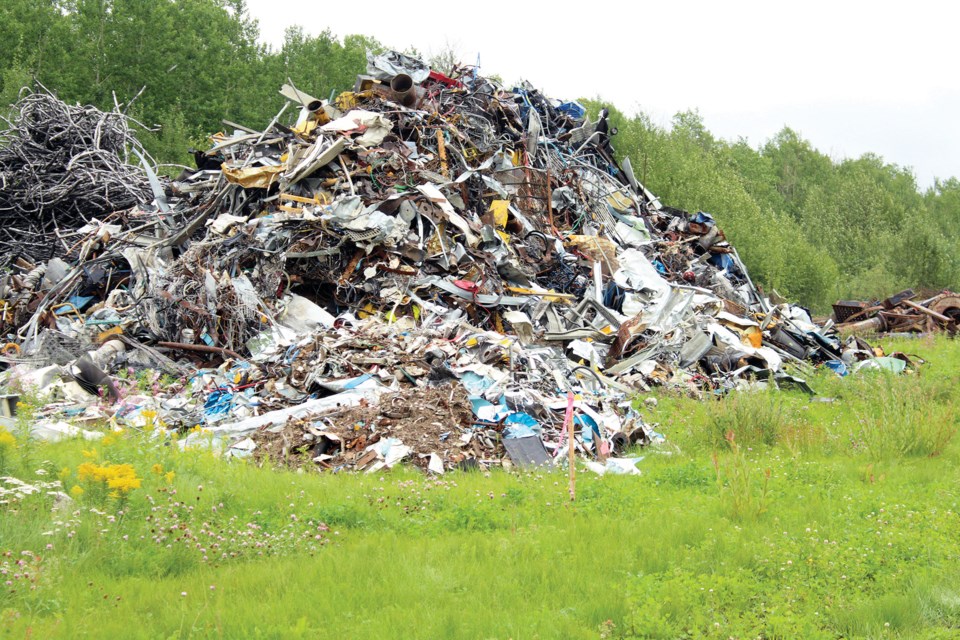ATHABASCA – A Breynat-area farmer who found piles of junk on and near his property, says he’s “relieved” that Athabasca County council has denied a Saskatchewan-based company’s rezoning application that would have allowed it to continue to operate a scrapyard next to his land.
At their Aug. 31 regular council meeting, councillors deadlocked 4-4 (Coun. Kelly Chamzuk had to abstain since she was absent from the public hearing) on second reading for Bylaw 006-2023, which would have rezoned SNW 14-70-17-W4M from Agricultural (A) to Light Industrial (M1) land, in order to allow W.I.L. Demolition and Salvage, a Saskatchewan-based scrap-metal company, to continue operations. Under the Municipal Government Act, a motion that ends tied is defeated; reeve Brian Hall voted for the rezoning, as did councillors Ashtin Anderson, Camille Wallach, and Natasha Kapitaniuk, while councillors Tracy Holland, Joe Gerlach, Rob Minns, and Gary Cromwell were opposed.
“We’re very relieved that it didn’t go through,” said Allan Jenkins, a farmer and owner of the neighboring property in a Sept. 1 interview. “I’m glad that Athabasca County agreed with us that it was not the right place for it.”
The Jenkins’ family were one of the impacted parties that had spoken against the scrapyard during a July 27 public hearing, where they highlighted, among others, concerns about safety, environmental controls and road quality.
“I feel bad for the guy who purchased the property and put it in place,” said Jenkins. “I think that in the proper place in the county, that kind of business would be beneficial, but I think that the councillors were right in that they need to establish areas for businesses of that size.”
Location was on the minds of councillors when they discussed the project; the yard, which is owned by W.I.L., is situated on land that is agricultural in name only.
“The subject land is not really agricultural land, it’s treed and that’s just the default classification for parcels,” said Hall. “There’s other ‘M’ class land further in that area, that’s farther away from the highway. My question is about how these concerns could be mitigated.”
Environment vs. the economy
Kapitaniuk noted that the project fell under the first pillar of the county’s 2023-2026 Strategic Plan, “Strengthening the Economy”, and that in some ways the complaints were part of the “not in my backyard” syndrome.
“We all want to own things, but we don’t want to face what happens to them afterwards,” said Kapitaniuk. “We need places like this; without places like this the environmental consequences are that trucks end up rotting in farmyards. There’s no perfect outcome to not having wrecking yards either.”
In a Sept 2 interview, Hall touched on the balancing act between industry and ratepayers that they’re always sensitive to.
“The great thing about councils is that they’re made up of nine of us, and we all have different experiences and skill sets. The balancing act is tricky, and it’s a big part of what we do, but in a case like this we take into account what we’ve heard at the public hearing and what we heard from each other,” said Hall.
While W.I.L. won’t be able to use the lot in question for what they want, Hall said that there are avenues the county could take to work with the company moving forwards. W.I.L. owner Walter Strutynski couldn’t be reached for comment by deadline.
“We can work with them to identify other suitable parcels. We’ve talked in the past about growth, and there’s areas that are designated for industrial development,” said Hall. “They should be able to work with development officers and find something suitable for their development.”
Both councillors and the Jenkins family expressed regret for how things ended, but some felt that the company hadn’t been completely upfront.
“I myself don’t agree with the way that this was all brought around,” said Coun. Rob Minns. “Just because they could do it in Saskatchewan, well sometimes, you’ve got to click your heels and realize where you’re at.”



